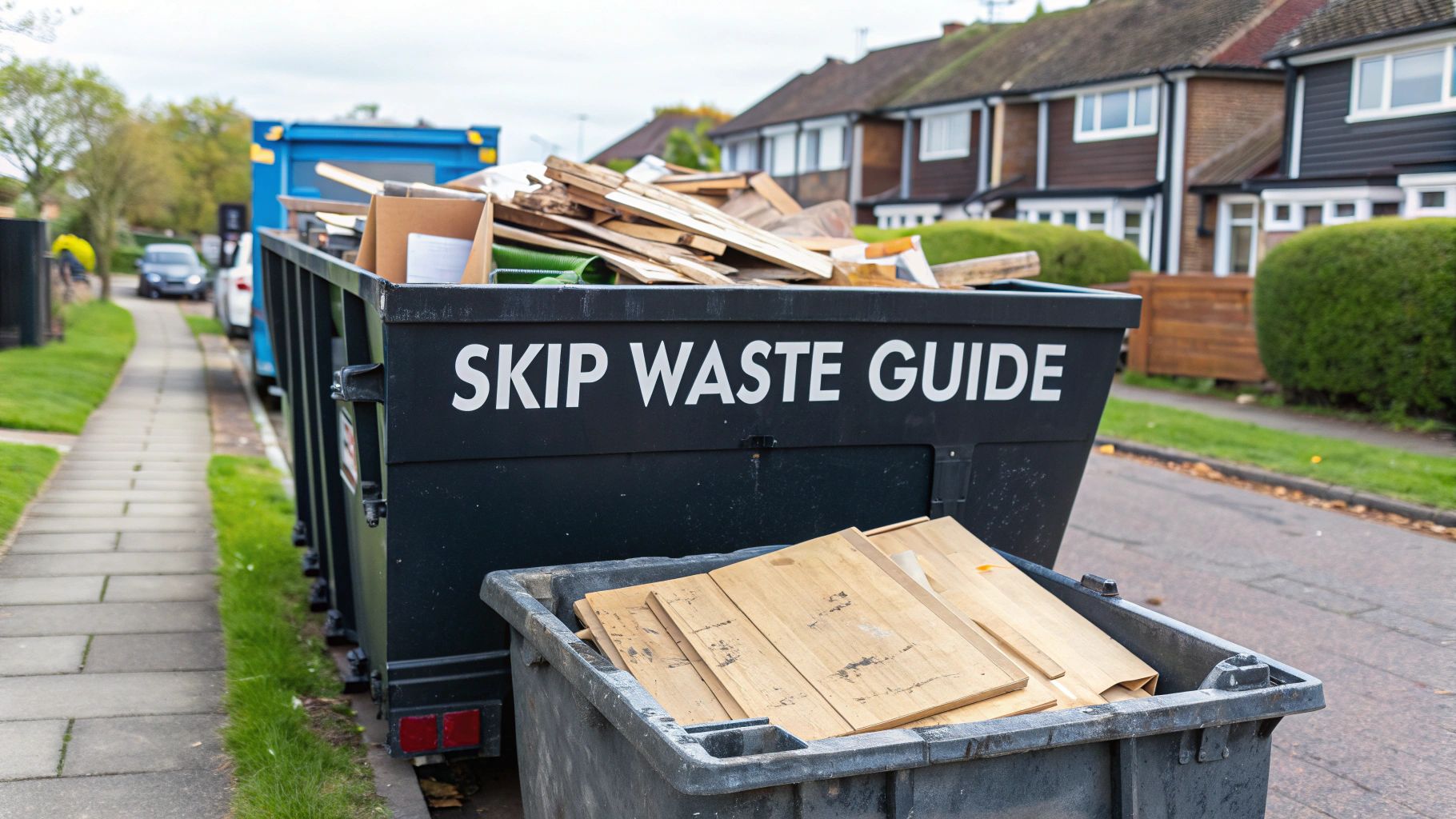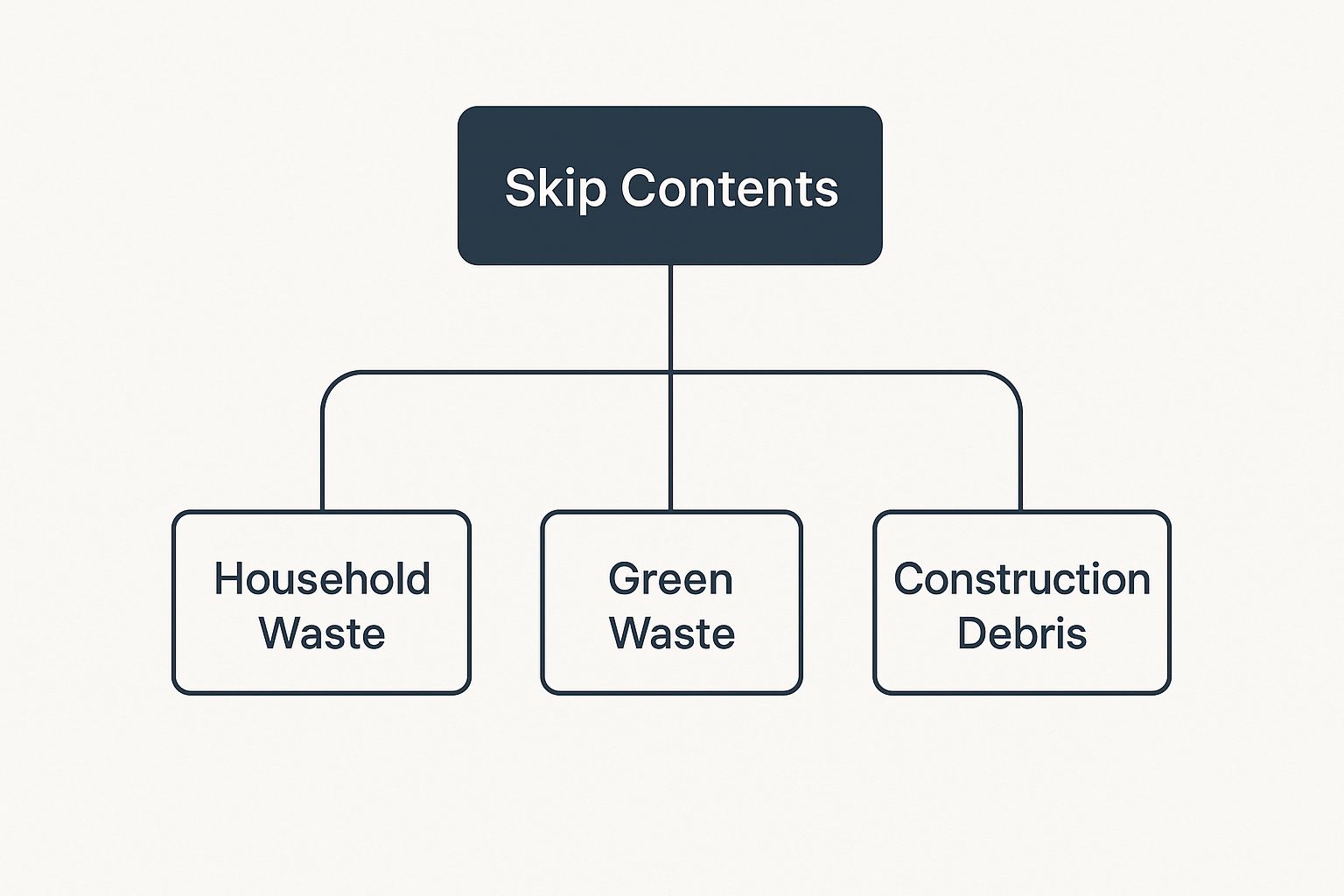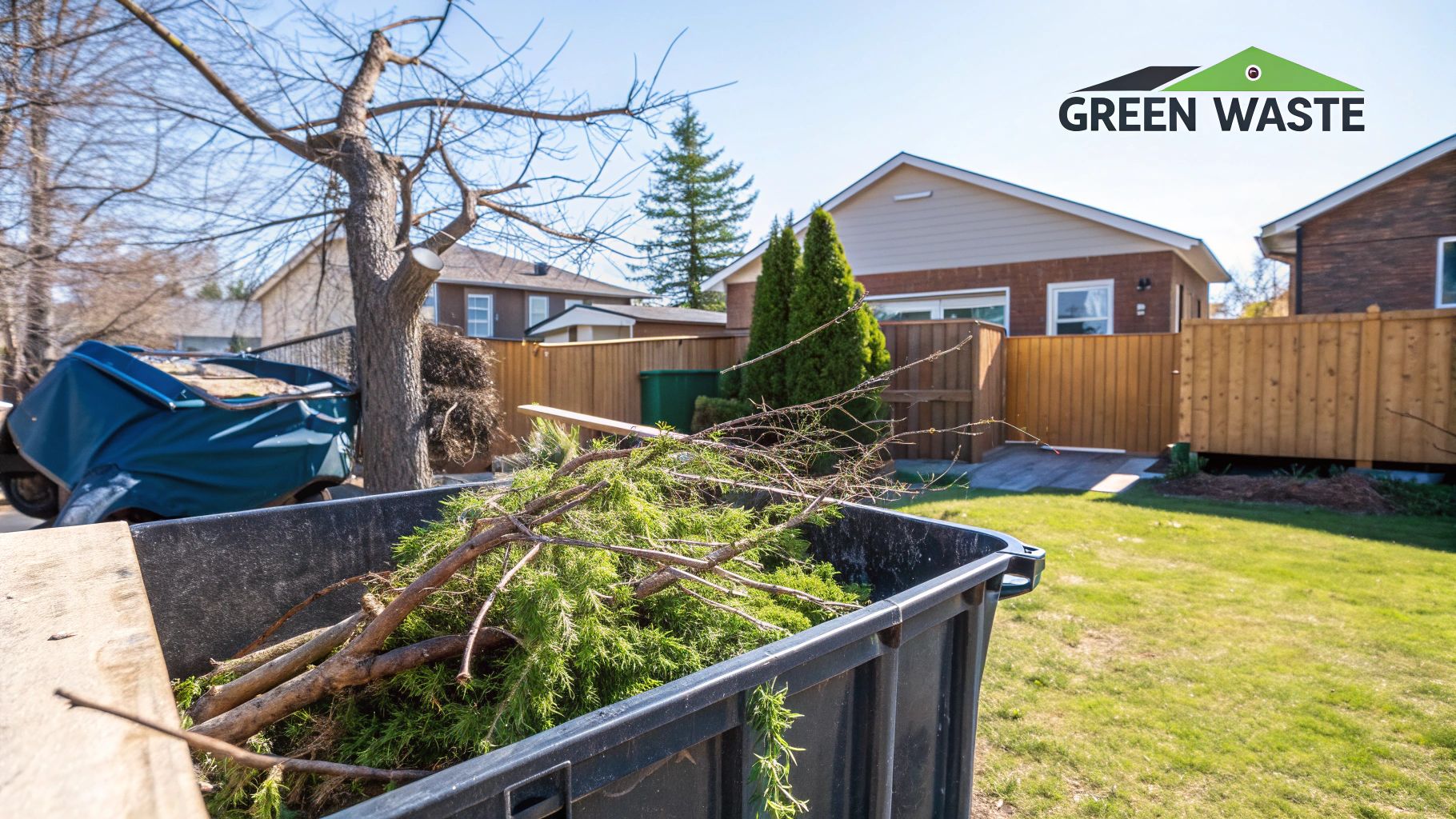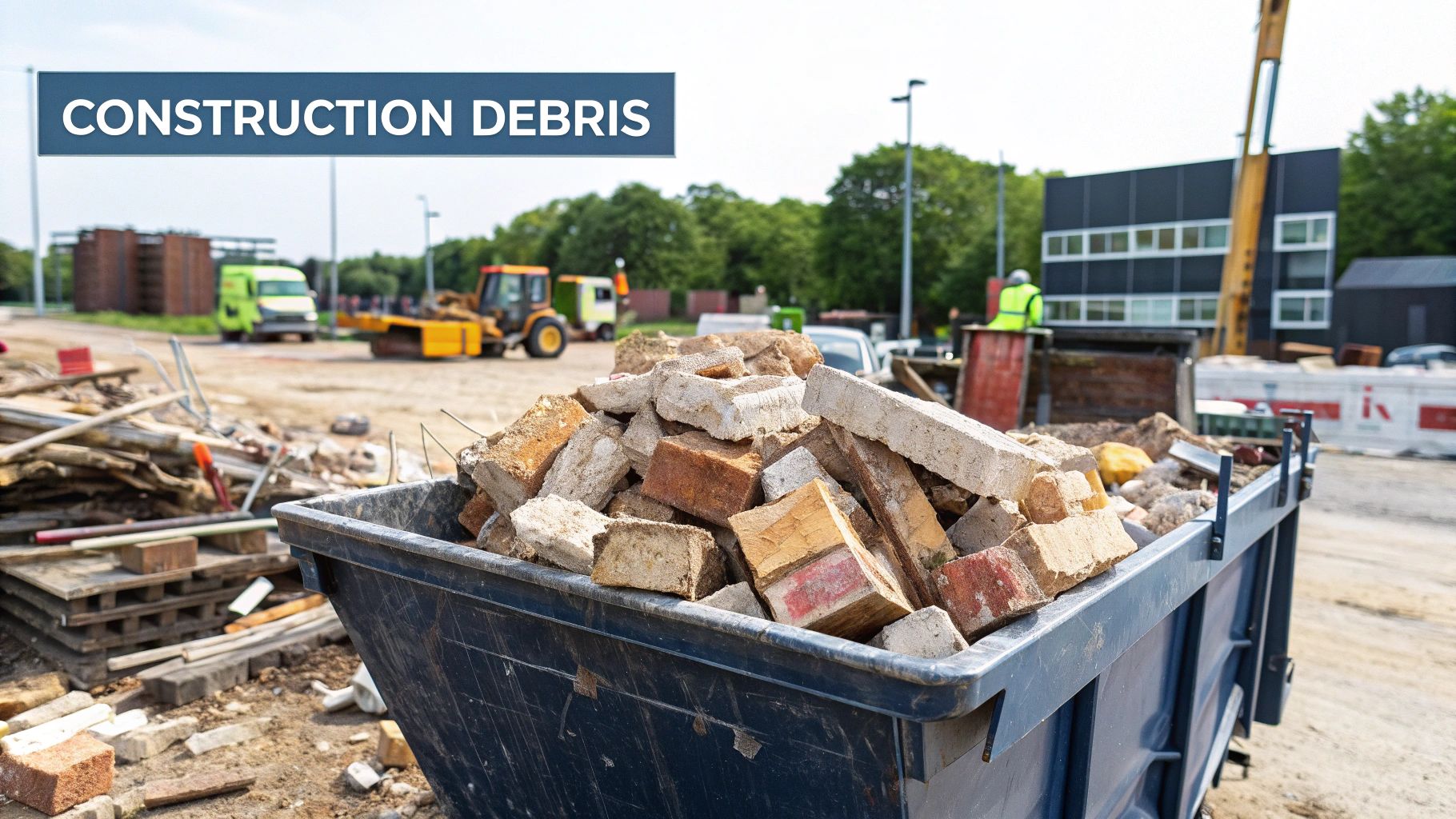What Can Go in a Skip? Complete UK Waste Guide

What Can Go in a Skip? Complete UK Waste Guide
So, what can you actually put in a skip? Broadly speaking, most everyday household, garden, and construction waste gets the green light. Think old furniture, soil from a garden project, wood, bits of metal, and rubble. The big exceptions are hazardous materials – those are a strict no-go.
A Quick Guide to Filling Your Skip
Hiring a skip is a brilliant way to tackle the mountain of rubbish from a home renovation, a garden blitz, or just a massive declutter. But knowing what you can chuck in from the get-go will save you a world of pain later on – avoiding extra charges, rejected loads, and headaches with the hire company.
The simplest way to think about it is this: a skip is for all the bulky, non-hazardous stuff your regular council bin collection won't touch. This diagram gives you a quick visual breakdown of the main waste types that are perfectly fine.

As you can see, most of what you'll generate during common projects falls neatly into the household, green, or construction waste categories.
Permitted vs Prohibited Items for UK Skips
To make things crystal clear, seeing a side-by-side comparison is often the easiest way to get it right. Here’s a quick-reference table showing what you can safely load up versus what is absolutely forbidden.
It’s crucial to keep these prohibited items out, not just for the skip company's sake, but for safety and environmental protection too. If you're handling a really big job like a full house clearance, understanding waste management is key. For those situations, a good guide to estate cleanout services can offer more specialised advice.
| What You CAN Put in a Skip | What You CANNOT Put in a Skip |
|---|---|
| General Household Waste: Old furniture, toys, carpets, non-electrical fittings. | Hazardous Waste: Asbestos, paint tins, solvents, chemicals, batteries. |
| Garden Waste: Soil, grass cuttings, leaves, branches, wood. | Electricals (WEEE): Fridges, TVs, computers, microwaves, phones. |
| Construction Debris: Bricks, rubble, concrete, metal, plastics, packaging. | Liquids & Oils: Any type of liquid, including cooking or engine oil. |
| Inert Materials: Soil, clay, sand, and hardcore (often in smaller skips). | Other Banned Items: Plasterboard, tyres, gas cylinders, fluorescent tubes. |
Treat this table as your go-to checklist before you start throwing things in. Sticking to these rules means your waste can be processed properly, more of it gets recycled, and you won't get hit with any nasty surcharges for a contaminated load.
A Detailed Guide to What Can Go in a Skip
Knowing exactly what you can and can't toss into a skip is the key to a smooth project. Get it right, and you'll avoid surprise fees or, even worse, the skip company refusing to collect it. Think of it like packing a suitcase for a holiday – a little bit of planning helps you fit everything in perfectly without any hassle at the airport.
Generally, the stuff we throw out falls into three buckets: household junk, garden waste, and construction debris. Let's break down what's usually fair game in each category.

Household and Furniture Waste
This is the classic "clutter" you'd clear out during a big spring clean or when moving house. It's easily one of the most common reasons people hire a skip in the first place, letting you get rid of all those bulky bits and pieces that would never fit in your wheelie bin.
Most of your non-electrical household items are good to go.
- Furniture: Sofas, chairs, tables, wardrobes, and bed frames are all fine. A top tip is to break them down first; you'll be amazed at how much space you can save.
- Carpets and Flooring: Old carpets, underlay, laminate, and vinyl flooring can all be chucked in.
- Toys and Plastics: Kids' old toys, plastic storage boxes, and other non-electrical plastic items are perfectly acceptable.
- General Bric-a-Brac: Things like books, old kitchenware, and general clutter can be thrown in without a second thought.
Garden and Green Waste
Tackling an overgrown garden or a new landscaping project can create a mountain of organic waste. A skip is the ideal solution for getting rid of all this heavy, awkward material in one fell swoop. For bigger jobs, knowing what to expect from the materials generated from excavation and land clearing is vital for planning your disposal.
Most of the natural stuff from your garden is welcome in a skip.
- Soil and Clay: Perfect for getting rid of the earth from digging new foundations or levelling out your garden.
- Greenery: This covers grass cuttings, weeds, leaves, and smaller branches.
- Wood: Old fence panels, timber from a dismantled shed, and tree trimmings can all be included.
Pro Tip: When loading garden waste, put the heaviest items like soil and turf at the bottom. This creates a solid base and lets you pack lighter materials like branches and leaves on top, making sure you use every last inch of space.
Construction and DIY Debris
Home renovations and DIY projects are another top reason for hiring a skip. The waste from this kind of work is often heavy, dusty, and definitely not suitable for your regular bin collection. A skip is pretty much an essential bit of kit.
Most building materials are allowed, but how you load them is important.
- Bricks, Rubble, and Concrete: These "inert" materials are fine, but they are incredibly heavy. Because of this, many skip companies will only let you put them in smaller skips (usually up to 8 yards) to make sure the lorry stays within its legal road weight limit.
- Metals: Things like copper pipes, old radiators (make sure they're drained first!), and other scrap metals are accepted.
- Wood and Plaster: Un-treated timber, floorboards, and standard plaster are all fine to go in. However, plasterboard is a major exception and has to be kept separate from other waste types.
- Plastics and Packaging: This includes old plastic pipes, uPVC window frames (without the glass), and the packaging from your building materials.
Understanding Prohibited Items and Why They’re Banned
While it’s great to know what you can put in a skip, understanding what you can’t is arguably more important. These rules aren’t here to make your life difficult; they exist to protect people, the environment, and the machinery at waste processing facilities. Getting it wrong can lead to your skip collection being refused, hefty fines, and some serious safety hazards.
Think of a skip hire company like a special delivery service for your rubbish. They are fully equipped to handle your general waste, but they aren't licensed or prepared to deal with hazardous or volatile materials. Every banned item has a very good reason for being on the list, usually tied to the harm it can cause.

Hazardous Materials Explained
This is easily the most critical category of waste you can't put in a skip. Hazardous materials are the big offenders – things that can cause real environmental damage or pose a direct threat to human health if they aren’t handled by specialists.
Here’s a look at the most common items and why they're a definite no-go:
- Asbestos: This stuff is incredibly dangerous if its fibres are inhaled, leading to serious lung diseases. It requires a specialist, licensed removal team and can never be mixed with other waste.
- Chemicals and Solvents: This covers everything from old tins of paint and thinners to pesticides and potent cleaning fluids. These liquids can leak into the groundwater, contaminate soil, and release toxic fumes.
- Batteries: Whether it’s a car battery or a handful of AAs, batteries contain corrosive acids and heavy metals like lead and mercury that pollute the earth. They’re also a major fire risk when they end up at recycling centres.
WEEE and Other Regulated Items
Beyond the obviously dangerous stuff, a whole other category of items is banned due to specific regulations. This is to make sure they are recycled or disposed of in a very particular way. This group is known as Waste Electrical and Electronic Equipment (WEEE).
Things like fridges, freezers, TVs, and old computers contain components that are either harmful (like the cooling agents in fridges) or valuable and need to be recovered properly. They have to be taken to dedicated WEEE processing facilities. For a deeper dive, check out our guide on 9 items you should never put in a skip bin.
The scale of waste we produce is staggering. In 2023, England alone generated 21.7 million tonnes of household waste. A huge chunk of what goes to landfill—around 88%—is made up of mixed materials that haven't been sorted properly, which shows just how vital it is to get it right from the start.
Navigating Special Disposal Rules
Some items aren't hazardous in the same way as asbestos, but they still come with their own strict disposal rules, which is why they can't go in a general waste skip.
- Plasterboard: When plasterboard gets mixed with other damp waste in a landfill, it can start to break down and produce hydrogen sulphide – a toxic and incredibly smelly gas. It must always be kept separate.
- Tyres: Tyres are another item that needs special handling. They are strictly prohibited from skips because of environmental regulations. There are specific guidelines for tyre disposal that you need to follow to avoid any costly mistakes.
- Gas Cylinders: These are a massive explosion risk if they get crushed or damaged in transit or at a facility. They must always be returned to the supplier or taken to a specialised disposal point.
For any of these prohibited items, your first port of call should be your local council. Most have a household waste recycling centre (HWRC) that can accept hazardous materials or point you in the direction of a licensed service that can.
Avoiding Common and Costly Skip Hire Mistakes
Knowing what you can put in a skip is only half the battle. To guarantee a smooth, cost-effective project, you also need to know what not to do. Certain items and bad habits can easily trip you up, leading to a refused collection, unexpected fines, or even a dangerous situation on your driveway. Getting these details right is the key to a hassle-free hire.
One of the biggest culprits causing confusion is plasterboard. It looks like any other bit of construction debris, but it hides a nasty secret. When plasterboard gets damp and mixes with other waste in a landfill, it starts to break down and release hydrogen sulphide gas—a toxic substance that smells like rotten eggs.
Because of this environmental hazard, you must always keep plasterboard separate from your general rubbish. Most reputable skip hire companies will offer dedicated plasterboard bags or can sort out a separate collection to handle it properly and legally. Whatever you do, don't be tempted to bury it at the bottom of the skip and hope for the best.

Sidestepping Other Frequent Errors
Beyond plasterboard, a few other common mistakes can easily derail your waste disposal plans. Keeping these in mind will save you a world of trouble (and money!).
A critical error we see all the time is overloading the skip. Every skip has a maximum fill line clearly marked, usually around the top rim. Piling waste high above this line isn't just breaking your hire agreement; it's a serious safety violation. An overloaded skip simply can't be transported safely or legally on public roads.
If our driver arrives to find a dangerously overfilled skip, they will have to refuse the collection until you've removed all the excess waste. This can cause delays and might even lead to extra hire charges. A much better approach is to learn how to fill a skip for maximum efficiency. This helps you get the most out of the space you've paid for without breaking any rules.
Here are a few other slip-ups to watch out for:
- Forgetting about mattresses: Lots of companies won't take mattresses, or they'll add a hefty surcharge because they are so difficult and expensive to recycle. Always mention you have a mattress when you book.
- Incorrectly mixing heavy waste: Inert waste like soil, rubble, and concrete is incredibly heavy. It should only go in smaller skips (typically 8 yards or less) to make sure the lorry stays within its legal weight limit.
- Assuming all wood is the same: While standard timber is absolutely fine, treated wood like old railway sleepers or telegraph poles can contain creosote and will need specialist disposal.
Key Takeaway: The golden rule of skip hire is simple: when in doubt, just ask. A quick phone call to your skip provider to check if an item is allowed is always a better bet than facing a fine or a refused collection down the line.
How Contamination Undermines Your Recycling Efforts
Knowing what you can and can't put in a skip is about more than just dodging extra charges; it’s about ensuring your good intentions don't go to waste. You know the old saying: one bad apple can spoil the whole barrel. It's exactly the same in the world of waste management. We call it skip contamination, and its impact is massive.
When a single rogue item—like an old gas canister, a TV, or a half-empty tin of paint—gets chucked in with everything else, it can contaminate the entire skip load. Suddenly, tonnes of otherwise perfectly good materials like wood, metal, and soil are rejected outright by the recycling facility.
The Domino Effect of a Single Mistake
The fallout from contamination creates a real domino effect right through the recycling system. Once a skip load is flagged as contaminated, it can't be sorted for recovery. Instead of being turned into new products, its journey is cut short and it gets rerouted straight to a landfill.
It's a huge own goal that seriously undermines the UK's recycling targets and adds to our collective environmental footprint. And unfortunately, it happens far more often than you might think.
A recent audit of commercial skip collections uncovered a pretty startling statistic: around 68% of skip waste in the UK still ends up in landfill, and contamination is a huge part of the problem. That same audit found an average contamination rate of 23% in skips that were meant to contain only construction materials.
Making Your Efforts Count
This data shows that following the rules isn't just a bit of red tape—it’s the one crucial step that makes sure your effort to be responsible actually counts for something. A clean, well-sorted skip is a direct contribution to the circular economy, allowing those valuable resources to be recovered and used again.
When you take that extra minute to separate out an old car battery or put plasterboard to one side, you’re protecting the integrity of the entire recycling chain. It also really helps to choose the right container for your job from the get-go; have a look at our advice on what size skip you might need to make sure you have enough space to sort things properly.
At the end of the day, a clean skip is a successful one.
Your Skip Hire Questions Answered
Even when you've got the rules down, a few questions always seem to crop up once you actually start filling the skip. Getting ahead of these common queries can save you a world of time, money, and hassle when collection day rolls around.
Let's clear up some of the most frequent sticking points people run into during a clear-out.
Can I Put Soil and Rubble in a Skip?
Yes, you can absolutely load up a skip with soil, rubble, bricks, and concrete. But there’s one massive catch: the weight. These materials, what we call inert waste in the business, are incredibly heavy.
For that reason, skip hire companies have to limit them to smaller skips, usually a 6-yard skip or smaller. This isn't just a company rule; it’s a legal requirement. It ensures the skip lorry stays within its safe and legal weight limit for the road. It's always worth asking if your provider offers a special "inert waste only" skip, as you can often get a better price.
What Happens If I Put a Prohibited Item in My Skip?
Sneaking a banned item into your skip can backfire in a few ways, ranging from annoying to seriously expensive. If the driver spots something they can't take during collection, they'll likely refuse to lift the skip until you've removed it yourself.
If the item isn't found until it reaches the waste transfer station, things get more complicated. The skip company will contact you, and you can almost guarantee you'll be hit with significant extra charges to cover the specialised, legal disposal of that item. For really dangerous stuff like asbestos, you could even be reported to the Environment Agency and face legal action.
The Bottom Line: It's always, always cheaper and safer to sort out prohibited waste correctly from the get-go. A quick call to your local council will point you to the proper, official disposal routes for hazardous items.
Do I Need to Break Down Large Items Like Furniture?
While it’s not always a strict rule, breaking down big, bulky items is one of the smartest things you can do. A whole wardrobe or an intact dining table is a space-killer, creating huge empty pockets of air that you're paying for but can't use.
Taking a few minutes to disassemble furniture means you can load the skip far more effectively. You can lay the flat panels down to create a solid base and pack everything in tightly, maximising every last bit of space. This simple step often means you can get away with a smaller, cheaper skip or avoid having to order a second one.
Can I Put a Mattress in a Skip?
This one is a firm "maybe"—and you absolutely must check with the skip company first. Many providers won't accept mattresses in a standard skip at all, while others will allow it but with a significant surcharge.
Why the fuss? Mattresses are a nightmare to process at recycling facilities. They’re bulky, they don't compact well, and their mix of materials (springs, foam, fabric) has to be pulled apart by hand, which is an expensive and time-consuming job.
Before you book, always tell the company if you have a mattress to get rid of. Often, your local council will have a bulky waste collection service that can be a much cheaper and easier option.
For any project, big or small, getting your waste management right is crucial. The Waste Group offers reliable, next-day skip hire with a price-match guarantee, ensuring you get the best service and value in Dorset. Get in touch with our experts today.
